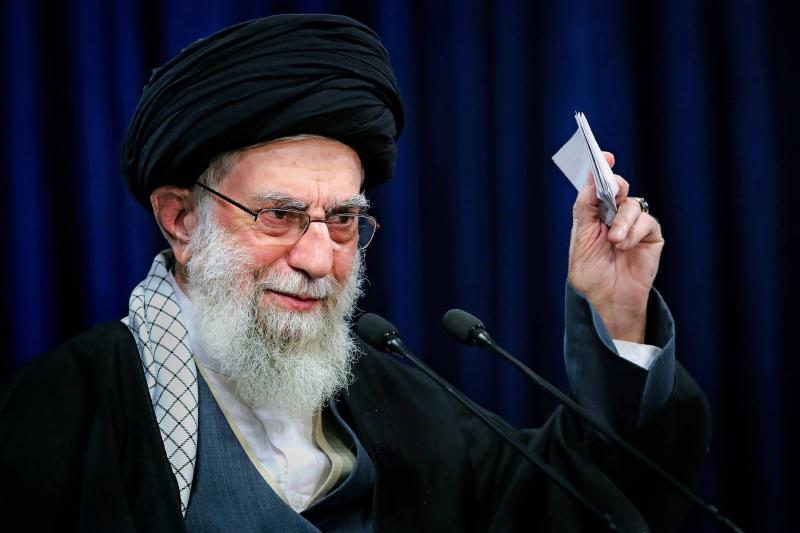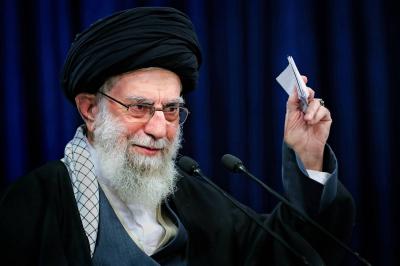When intelligence officials presented a report to Iran's Supreme Leader Ayatollah Ali Khamenei in May ahead of early presidential elections, their findings were grim. The report indicated that a majority of Iranians, angered by economic hardships and repression of social freedoms, planned to boycott the elections, with anticipated voter turnout around only 13%. Five informed sources reported that "Khamenei decided at that time to plan for a meticulously directed election, paving the way for a reliable but obscure moderate, Masoud Pezeshkian, to ascend to the presidency in a race initially dominated by hardline conservatives."
The five individuals, including two hardline conservatives, a senior security official, and two close insiders of Khamenei, revealed that the Supreme Leader convened several of his most trusted advisors to discuss his plan in at least three meetings in late May at his residence in a fortified compound in Tehran. One attendee indicated that Khamenei was concerned that weak voter turnout could harm the credibility of the religious institution and instructed those present to find a way to manage the electoral process.
The call for elections followed the death of President Ebrahim Raisi in a helicopter crash in May, an event that disrupted the plans of many hardline conservative colleagues who wanted Raisi to succeed the 85-year-old Khamenei, igniting competition among hardliners to influence the selection of the next Supreme Leader. Khamenei's meetings included a small group of senior officials, security aides, and his close ally and advisor Ali Akbar Velayati, alongside two significant leaders of the influential Revolutionary Guard.
Sources familiar with Khamenei’s discussions during these meetings indicated that his goal was to preserve the Islamic Republic amid internal opposition and escalating tensions with the West and Israel regarding Gaza, amplified by the roles of Tehran-backed Hezbollah in Lebanon and Iranian-allied Houthis in Yemen. One source noted that Khamenei believed Iran needed a president who would be acceptable to various social strata without challenging the Shia religious rule.
Several names were proposed during the second meeting. Two sources confirmed that Khamenei suggested Pezeshkian as a person capable of fostering unity among those in power, bridging the gap between the religious institution and the public, and ensuring a smooth selection process for the next Supreme Leader. Reformist analyst Saeed Lelaz from Tehran remarked, "It was a flawless plan by the Supreme Leader... it secured the survival of the Islamic Republic." He added that Pezeshkian would avoid any domestic crises, whether with the public or the institution, enabling senior leaders to make decisions about succession and plan in a calm atmosphere.
Khamenei's office, the IRGC's public relations office, and Pezeshkian could not be reached for comment, and Velayati's office declined to comment.
### Election Engineering
The new president is not expected to make significant shifts in Iran's nuclear or foreign policies, nor in its approach to alliances with factions and groups in the region. However, he will closely participate in selecting a successor for Khamenei, who holds the final say in the country's top affairs. Sources indicated that Pezeshkian's moderate record would appease disgruntled Iranians and guarantee internal stability amid increasing external pressures while providing Khamenei with a reliable ally in selecting his eventual successor.
A regional source close to Iranian power circles stated that Pezeshkian's election was "engineered" to defuse tensions following a wave of protests sparked by the death of a young woman in custody in 2022 and the stricter social restrictions imposed by Raisi. Two sources noted the preliminary phase of Khamenei's plan began when Deputy Pezeshkian registered to run in the June 28 elections, encouraged by pragmatic former officials with ties to the Supreme Leader's office. They added that Pezeshkian was unaware of the decisions made behind the scenes and did not expect to be approved by the Guardian Council, a non-elected vetting body comprised of six clerics and six law scholars aligned with Khamenei that has previously disqualified many prominent moderates and conservatives.
The five informed sources noted that Khamenei's plan was designed to appear fair and democratic, leading the Guardian Council to approve the candidacies of two prominent hardline conservatives: former nuclear negotiator Saeed Jalili and parliament speaker Mohammad Baqer Qalibaf. This suggested that pro-hardliner votes would likely be split between them, making it difficult for either to advance to a runoff.
Jalili belongs to the hardline "Steadfastness Front," which advocates stricter social constraints, self-reliance, and a tough foreign policy and is believed to have already chosen his candidate to succeed Khamenei, according to former Iranian reformist lawmaker Nourodin Beramoon, who now lives in the United States. Three analysts and two diplomats indicated that a Jalili victory, who opposed the 2015 nuclear deal with world powers, would send a negative signal to the West that is ramping up pressure on Tehran due to its rapidly advancing uranium enrichment program.
A Western diplomat in the region stated, "With the increasing likelihood of Donald Trump's return to the White House... the Islamic Republic needs a moderate figure to keep dialogue with the West open and reduce tensions."
A spokesperson for the Guardian Council asserted, "It was an election characterized by transparency and integrity," while a spokesperson for the U.S. State Department stated, "We cannot speculate on specific theories about what may have occurred behind the scenes of the recent Iranian presidential election. What we can say for certain is that elections in Iran are neither free nor fair." A National Security Council spokesperson did not directly respond to questions regarding key points of this story but noted that Washington did not anticipate that the elections would lead to a fundamental change in Iran's direction or greater respect for human rights for its citizens.
### Desired Outcome
Pezeshkian, who belongs to the Azerbaijani ethnic minority, garnered the highest number of votes in the first round due to a key voter base made up of many middle-class city dwellers or disillusioned youth affected by years of security campaigns in the country. However, voter turnout did not exceed 40%, marking the lowest turnout in any election in the Islamic Republic's history. The runoff occurred between Pezeshkian and Jalili, who is staunchly anti-Western. Qalibaf, a security hawk echoing Khamenei's views on major issues like supporting clerical power, came in third.
Many Iranians who voted for Qalibaf or abstained in the first round cast their votes for Pezeshkian in the second round, fearing Jalili's aggressive domestic and foreign policies. The second round took place on July 5, with voter turnout among the 61 million eligible voters rising to nearly 50%. Ultimately, Khamenei's plan achieved the desired result.
Pezeshkian, a 69-year-old heart surgeon, won 54% of the votes with support from reformists, moderate conservatives, and ethnic minorities. He told state television, "I thank the Supreme Leader. I believe that without him, my name would not have emerged easily from the ballot boxes." Two sources close to Khamenei reported that "Pezeshkian was referring to an order issued by the Supreme Leader to election officials to ensure that votes were counted correctly." Election authorities stated that no complaints about vote fraud had been received.
Pezeshkian, a supporter of Iran's religious governance, committed to a pragmatic foreign policy to de-escalate tensions surrounding the currently stalled negotiations to revive the 2015 nuclear agreement with major powers and improve the prospects for social liberalization. He spoke about women's rights and ethnic minorities and criticized the police's handling of the Kurdish Iranian woman Mahsa Amini, who died in custody in 2022 after being arrested for violating Islamic dress rules. In 2022, Pezeshkian stated, "They arrested a girl for showing a few strands of her hair... and returned her as a corpse to her family. This behavior is unacceptable."
However, many analysts question Pezeshkian's ability to fulfill all his electoral promises, as he had previously declared he did not intend to confront the powerful clerics and security hawks in Iran.




